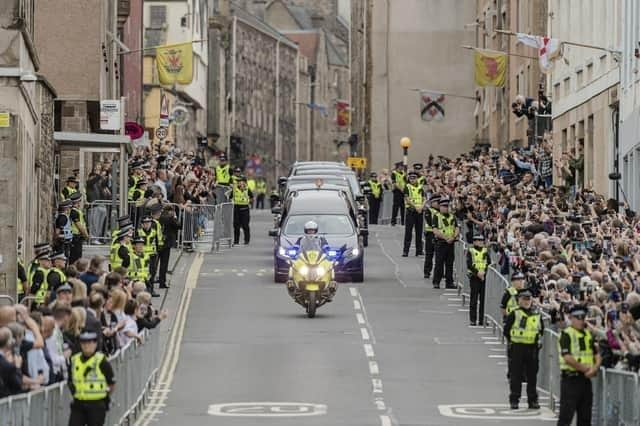Queen Elizabeth II death: Concerns raised over arrest of anti-royal protesters in Scotland and England


Joanna Cherry, the high-profile SNP MP, stressed the right to protest is “fundamental to our democracy”, while David Davis, the Conservative MP and former minister, said he had written to Police Scotland about the issue.
Labour MSP Carol Mochan said she would be raising the matter in the Scottish Parliament when it reconvenes.
Advertisement
Hide AdAdvertisement
Hide AdIt came as a former counter-terror chief said police had been “overzealous” in their handling of anti-monarchy protesters.
Nick Aldworth said the late Queen would not have wanted “interference with legitimate protest” and called the actions of some officers “inappropriate overprotectiveness towards the dignity of the event”.
He also backed the Metropolitan Police, which made clear people “absolutely have a right to protest” after demonstrators were moved on in London and arrests were made in Edinburgh and Oxford.
Mr Aldworth, who was the national co-ordinator for UK counter-terrorism policing until 2019, said: “There was an inappropriate overprotectiveness towards the dignity of the event. And I think the Met has come out very strongly and said ‘no, that’s not right’.
“The nature of cops and the military is we all swear an oath of allegiance and I think sometimes we forget that part of allegiance is upholding what the Crown would want.
“I met the Queen on countless occasions across my career and the one thing I’m pretty certain about was that she was an advocate of democracy and she would not want that level of disruption and interference with legitimate protest.”
“They didn’t act appropriately, it’s overzealous.”
The Met issued a statement on Monday night after a viral video from Parliament Square in central London showed barrister Paul Powlesland holding up a blank piece of paper and being asked for his details by an officer.
Mr Powlesland said the officer told him he risked being arrested if he wrote “not my King” on the paper.
Advertisement
Hide AdAdvertisement
Hide AdDeputy Assistant Commissioner Stuart Cundy said: “The public absolutely have a right of protest and we have been making this clear to all officers involved in the extraordinary policing operation currently in place and we will continue do so.
“However, the overwhelming majority of interactions between officers and public at this time have been positive as people have come to the capital to mourn the loss of Her Late Majesty the Queen.”
Police Scotland has charged two people in connection with a breach of the peach after two incidents.
A 22-year-old woman was arrested during the Accession Proclamation for the King outside St Giles’ Cathedral in Edinburgh on Sunday.
On Monday afternoon, a 22-year-old man was arrested on the Royal Mile. Footage appeared to show a man heckling the royal procession as it went past.
Activists gathered outside St Giles’ Cathedral on Tuesday afternoon to protest against the arrests.
The group were pictured carrying “blank canvases” as members of the public continued to file into the place of worship to pay their respects to the late monarch.
Ms Cherry, who is a King's Counsel, wrote on Twitter: “I’m concerned by reports in Scotland and England of seemingly legitimate protesters being arrested.
Advertisement
Hide AdAdvertisement
Hide Ad"Whilst many might question whether this is an appropriate time for such protests, the right to protest is fundamental to our democracy and should be facilitated.”
Roddy Dunlop KC, dean of the Faculty of Advocates, said he concurred with Ms Cherry's concerns.
He tweeted: “Whilst my own view is that common decency means that now should be a time of reflection rather than protest, the right to protest is a fundamental one, and should not be restrained unless the criminal law is being broken. There’s also a difference between protest and abuse.”
In a letter to Iain Livingstone, Chief Constable of Police Scotland, Mr Davis said a “liberal approach would be desirable”.
He added: “I speak as a strong monarchist, but nevertheless, I hope that members of the public will remain free to share their opinions and protest in regard to issues about which they feel strongly.”
SNP MP Amy Callaghan insisted republican views “are as valid as any other”, adding: “No-one should be arrested for just expressing that.”
Ms Mochan said she shared the concerns of many “regarding reports people have been arrested for expressing their views in support of a republic”.
She tweeted: "Everyone has the right to express their opinions peacefully, this sets a dangerous precedent. I will be raising my concerns when Parliament reconvenes.”
Advertisement
Hide AdAdvertisement
Hide AdAdam Tomkins, a law professor and former Conservative MSP, also spoke out.
He tweeted: “Anyone choosing this moment to protest by placard against the monarchy in crowds of mourners is insensitive to the point of boneheaded crassness.
"But they should not be arrested for expressing their views unless their words incite violence. Obviously.”
Under Scottish law, someone can be charged with a public order offence of breaching the peace if their behaviour is disorderly and could have a negative effect on those who witness it such as swearing or shouting.
In England and Wales, offences of disorderly behaviour – such as threatening or abusive language, behaviour, signs or writing – which is likely to cause others present harassment, alarm or distress fall under section 5 of the Public Order Act and could lead to a fine.
A number of campaign groups have expressed concern at the way officers are policing protests as the new King is declared, with some warning the arrests may be unlawful.
Symon Hill was arrested on suspicion of a public order offence after shouting “who elected him?” when he came across a public formal reading of the proclamation of the accession of the King in Carfax, Oxford. He was later de-arrested.

